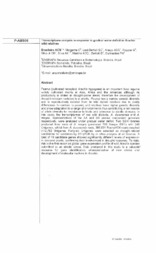Transcriptome analysis in response to gradual water deficit in Arachis wild relatives.
Transcriptome analysis in response to gradual water deficit in Arachis wild relatives.
Author(s): BRASILEIRO, A. C. M.; MORGANTE, C. V.; BERTIOLI, S. C. de M. L.; ARAUJO, A. C. G. de; PAPPAS, G.; SILVA JUNIOR, O. B. da; MARTINS, A. C. Q.; BERTIOLI, D.; GUIMARAES, P. M.
Summary: Peanut (cultivated tetraploid Arachis hypogaea) is an important food legume widely cultivated mainly in Asia, Africa and the Americas although its productivity is limited in drought-prone areas; therefore the development of drought-resistant varieties is a priority. Peanut has a narrow genetic diversity and is reproductively isolated from its wild diploid relatives due to ploidy differences. In contrast to peanut, wild relatives have higher genetic diversity and show adaptation to a range of environments thus constituting a rich source of allele diversity for resistance to biotic and tolerance to abiotic stresses. In this study, the transcriptomes of two wild diploids, A. duranensis and A. magna, representatives of the AA and BB peanut component genomes respectively, were analyzed under gradual water deficit. Two SSH libraries produced from roots of A. magna generated 759 Sanger ESTs with 249 Unigenes, whilst from A. duranensis roots, 380,601 Roche/454 reads resulted in12,792 Unigenes. Forty-six Unigenes were selected as drought-related candidates for validation by RT-qPCR by in silico analysis of all libraries. A total of 18 candidate genes showed significantly different levels of expression in stressed plants, confirming their involvement in drought response. To date, this is the first report on global gene expression profile of wild Arachis species submitted to an abiotic stress. Data produced in this study is a valuable resource for gene identification, characterization of new alleles and development of molecular markers in Arachis.
Publication year: 2012
Types of publication: Abstract in annals or event proceedings
Unit: Embrapa Semi-arid Region
Observation
Some of Embrapa's publications are published as ePub files. To read them, use or download one of the following free software options to your computer or mobile device. Android: Google Play Books; IOS: iBooks; Windows and Linux: Calibre.
Access other publications
Access the Agricultural Research Database (BDPA) to consult Embrapa's full library collection and records.
Visit Embrapa Bookstore to purchase books and other publications sold by Embrapa.

